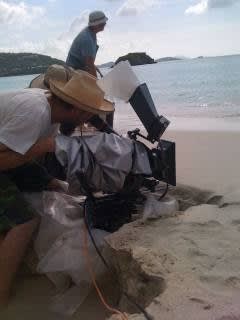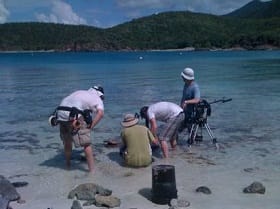Film commissions: Your first port of call
Choosing the right filming location is not just about looking at a few pretty pictures and booking the next flight. It’s a complex logistical exercise that requires a detailed understanding of what the on-the-ground experience will really be like.
By Andy Fry 5 May 2016

Choosing the right filming location is not just about looking at a few pretty pictures and booking the next flight. It’s a complex logistical exercise that requires a detailed understanding of what the on-the-ground experience will really be like.
That is why it helps to have a film office or film commission to guide you through the process, says Luana Wheatley, Film Office director at stunning Caribbean location the US Virgin Islands (USVI).
“I always like to be the first point of contact,” she says. “I want producers to call me and say ‘Here’s my storyboard, could this work in USVI? Would you support scouting? How film-friendly are you? Can you help with permitting? Can you introduce me to the right people to talk to about locations?’ I want to be able to help them by answering those questions.”
Not everyone wants to kick off their search with a phone call, so it’s also important to have an attractive, easy-to-navigate website, says Wheatley.
“We’ve recently revamped our website to provide producers with lots of information about our locations, the permitting process, production credits and our new incentive, which came into force around six months ago.”
Film commissions also have good relationships with public agencies (police, transport etc) so that visiting productions don’t run into obstacles during filming. They should always be on hand once production starts.
Attracting productions, ensuring producers pick your territory over others, is not easy. But, it does become easier if you have a good story to tell, and that is certainly the case with the US Virgin Islands. “We have beautiful white sandy beaches,” she says, “but if you dig a little deeper there is a real diversity of locations including rural farms, rainforests, rolling hills, European-style towns and colourful Caribbean architecture. That’s why we have been able to double for places like Greece, Mexico and Afghanistan.”
Then there is the exceptional incentive regime, which Wheatley believes will really put USVI on the map: “For productions with a minimum spend of $250,000 we’re offering up to a 17% transferable tax credit and up to a 29% cash rebate. That’s a total of 46% as long as producers meet certain criteria.”

Not to be overlooked is the fact that USVI is a US territory, which means it runs according to the same rules on entry, has the same currency, has English and Spanish speaking crews and benefits from good transport links. There’s even a K-Mart. “The one thing we can’t do is vote for the president,” says Wheatley.
Getting the message out about the locations and incentives is another key part of running a film office, adds Wheatley.
“It’s important to get on the radar by attending events and talking to industry decision-makers. We’re well known in the US but we want to forge better links with the European market.
“I found that the AFCI show in LA was particularly beneficial this year because we were able to talk about our incentives. I also like the Produced By Conference, organised by the Producers Guild Of America, which has a rewarding level of people. You’ve got to be proactive in this business. If you snooze, you lose.”
The way you convey your message is also important to the long-term health of your business, says Wheatley: “I aim to be strategic, honest and transparent. That’s the way people come back to you and are willing to pass on good word of mouth. So I’ll always tell people that we get storms in September, for example, or what our crewing and equipment strength is like (currently the USVI offers about 100 crew).”

Making the leap from an initial inquiry to a signed deal is, of course, a big one. For this reason, Wheatley says familiarisation, or ‘fam’ tours, are a key part of the film commission armoury.
“I’m looking at organising a fam trip for location managers and other key decision-makers. And I’ll also consider supporting a scout with accommodation and transport, if I’m convinced there is return-on-investment for the US Virgin Islands.”
In terms of what visitors would find, she says: “We’re a film-friendly place with four inhabited islands (St Croix, St John, St Thomas, Water Island) and numerous uninhabited islands which offer a variety of shorelines. There’s a great climate and diverse population covering African American, European, Caribbean, Arabic and Indian looks (good for casting and also for restaurants). It’s also not that hard to get to, with flights from Miami and Atlanta just 2.5-3 hours in duration.”
As for the role of a film office with regard to local expectations, Wheatley says: “Here, we’re under the tourism department but attracting tourists isn’t our first priority right now. This is about facilitating foreign shoots and through this creating jobs and having an economic impact. What we’d really like from the incentive is an anchor tenant, maybe a US or European TV series, so we can build our infrastructure. Hopefully film tourism will follow from that.”
“I always like to be the first point of contact,” she says. “I want producers to call me and say ‘Here’s my storyboard, could this work in USVI? Would you support scouting? How film-friendly are you? Can you help with permitting? Can you introduce me to the right people to talk to about locations?’ I want to be able to help them by answering those questions.”
Not everyone wants to kick off their search with a phone call, so it’s also important to have an attractive, easy-to-navigate website, says Wheatley.
“We’ve recently revamped our website to provide producers with lots of information about our locations, the permitting process, production credits and our new incentive, which came into force around six months ago.”
Film commissions also have good relationships with public agencies (police, transport etc) so that visiting productions don’t run into obstacles during filming. They should always be on hand once production starts.
Attracting productions, ensuring producers pick your territory over others, is not easy. But, it does become easier if you have a good story to tell, and that is certainly the case with the US Virgin Islands. “We have beautiful white sandy beaches,” she says, “but if you dig a little deeper there is a real diversity of locations including rural farms, rainforests, rolling hills, European-style towns and colourful Caribbean architecture. That’s why we have been able to double for places like Greece, Mexico and Afghanistan.”
Then there is the exceptional incentive regime, which Wheatley believes will really put USVI on the map: “For productions with a minimum spend of $250,000 we’re offering up to a 17% transferable tax credit and up to a 29% cash rebate. That’s a total of 46% as long as producers meet certain criteria.”

Not to be overlooked is the fact that USVI is a US territory, which means it runs according to the same rules on entry, has the same currency, has English and Spanish speaking crews and benefits from good transport links. There’s even a K-Mart. “The one thing we can’t do is vote for the president,” says Wheatley.
Getting the message out about the locations and incentives is another key part of running a film office, adds Wheatley.
“It’s important to get on the radar by attending events and talking to industry decision-makers. We’re well known in the US but we want to forge better links with the European market.
“I found that the AFCI show in LA was particularly beneficial this year because we were able to talk about our incentives. I also like the Produced By Conference, organised by the Producers Guild Of America, which has a rewarding level of people. You’ve got to be proactive in this business. If you snooze, you lose.”
The way you convey your message is also important to the long-term health of your business, says Wheatley: “I aim to be strategic, honest and transparent. That’s the way people come back to you and are willing to pass on good word of mouth. So I’ll always tell people that we get storms in September, for example, or what our crewing and equipment strength is like (currently the USVI offers about 100 crew).”

Making the leap from an initial inquiry to a signed deal is, of course, a big one. For this reason, Wheatley says familiarisation, or ‘fam’ tours, are a key part of the film commission armoury.
“I’m looking at organising a fam trip for location managers and other key decision-makers. And I’ll also consider supporting a scout with accommodation and transport, if I’m convinced there is return-on-investment for the US Virgin Islands.”
In terms of what visitors would find, she says: “We’re a film-friendly place with four inhabited islands (St Croix, St John, St Thomas, Water Island) and numerous uninhabited islands which offer a variety of shorelines. There’s a great climate and diverse population covering African American, European, Caribbean, Arabic and Indian looks (good for casting and also for restaurants). It’s also not that hard to get to, with flights from Miami and Atlanta just 2.5-3 hours in duration.”
As for the role of a film office with regard to local expectations, Wheatley says: “Here, we’re under the tourism department but attracting tourists isn’t our first priority right now. This is about facilitating foreign shoots and through this creating jobs and having an economic impact. What we’d really like from the incentive is an anchor tenant, maybe a US or European TV series, so we can build our infrastructure. Hopefully film tourism will follow from that.”
Latest news & features
Featured profiles
Promote your services with KFTV
Choose from three profile types - Basic, Silver and Gold
Create ProfileWe offer a range of display advertising opportunities.
Learn More